- Home
- Wendell Berry
Fidelity Page 3
Fidelity Read online
Page 3
“Get up,” he said. “Get yonder to that house ’fore I wear you out.”
He had never spoken to her in such a way, had never imagined himself doing so. He hated what he had done, and he could not undo it.
The heat of the day had established itself now. There was not a breeze anywhere, not a breath. A still haze filled the valley and redoubled the light. Within that blinding glare he occupied a darkness that was loud with accusing cries.
Martha Elizabeth stood at the kitchen door a moment, looking back at him, and then she went inside. Thad turned back to the team then, unhitched them, did up the lines, and led the mules to their stalls in the barn. He moved as if dreaming through these familiar motions that had now estranged themselves from him. The closer he had come to home, the more the force of his failure had gathered there to exclude him.
And it was Ben Feltner who had barred the door and left him without a friend. Ben Feltner, who owed nothing, had turned his back on his friend, who now owed everything.
He said aloud, “Yes, I’ll come back sober, God damn you to Hell!”
He lifted the jug out of the white mule’s manger, pulled the cob from its mouth, and drank. When he lowered it, it was empty. It had lasted him three days, and now it was empty. He cocked his wrist and broke the jug against an upright.
“Well, that does for you, old holler-head.”
He stood, letting the whiskey seek its level in him, and felt himself slowly come into purpose; now he had his anger full and clear. Now he was summoned by an almost visible joy.
He went to the house, drank from the water bucket on the back porch, and stepped through the kitchen door. Rachel and Martha Elizabeth were standing together by the cookstove, facing him.
“Thad, honey, I done fixed dinner,” Rachel said. “Set down and eat.”
He opened the stairway door, stepped up, and took down his pistol from the little shelf over the door frame.
“No, now,” Martha Elizabeth said. “Put that away. You ain’t got a use in this world for that.”
“Don’t contrary me,” Thad said. “Don’t you say another damned word.”
He put the pistol in his hip pocket with the barrel sticking up and turned to the door.
“Wait, Thad,” Rachel said. “Eat a little before you go.” But she was already so far behind him that he hardly heard her.
He walked to the barn, steadying himself by every upright thing he came to, so that he proceeded by a series of handholds on doorjamb and porch post and gatepost and tree. He could no longer see the place but walked in a shifting aisle of blinding light through a cloud of darkness. Behind him now was almost nothing. And ahead of him was the singular joy to which his heart now beat in answer.
He went into the white mule’s stall, unbuckled hame strap and bellyband, and shoved the harness off her back, letting it fall. He unbuckled the collar and let it fall. Again his rage swelled within him, seeming to tighten the skin of his throat, as though his body might fail to contain it, for he had never before in his life allowed a mule’s harness to touch the ground if he could help it. But he was not in his life now, and his rage pleased him.
He hooked his finger in the bit ring and led the mule to the drinking trough by the well in front of the barn. The trough was half an oak barrel, nearly full of water. The mule wanted to drink, but he jerked her head up and drew her forward until she stood beside the trough. The shorn stubble of her mane under his hand, he stepped up onto the rim. Springing, he cast himself across the mule’s back, straddled her, and sat upright as darkness swung around him. He jerked hard at the left rein.
“Get up, Beck,” he said.
The mule was as principled as a martyr. She would have died before she would have trotted a step, and yet he urged her forward with his heel. Even as the hind feet of the mule lifted from their tracks, the thought of Martha Elizabeth formed itself within the world’s ruin. She seemed to rise up out of its shambles, like a ghost or an influence. She would follow him. He needed to hurry.
On the fringe of the Saturday bustle in front of the business houses, Ben met Early Rowanberry and his little boy, Arthur. Early was carrying a big sack, and Art a small one. They had started out not long after breakfast; from the log house on the ridgetop where the Rowanberrys had settled before Kentucky was a state, they had gone down the hill, forded the creek known as Sand Ripple, and then walked up the Shade Branch hollow through the Feltner Place and on to town. Early had done his buying and a little talking, had bought a penny’s worth of candy for Art, and now they were starting the long walk back. Ben knew that they had made the trip on foot to spare their mules, though the sacks would weigh sorely on their shoulders before they made it home.
“Well, Early,” Ben said, “you’ve got a good hand with you today, I see.”
“He’s tol’ble good company, Ben, and he packs a little load,” Early said.
Ben liked all the Rowanberrys, who had been good neighbors to him all his life, and Early was a better-than-average Rowanberry—a quiet man with a steady gaze and a sort of local fame for his endurance at hard work.
Ben then offered his hand to Art, who shyly held out his own. But then Ben said, “My boy, are you going to grow up to be a wheelhorse like your pap?” and Art answered without hesitation, “Yes, sir.”
“Ah, that’s right,” Ben said. And he placed his hand on the boy’s unladen shoulder.
The two Rowanberrys then resumed their homeward journey, and Ben walked on down the edge of the dusty road into town.
Ben was in no hurry. He had his mission in mind and was somewhat anxious about it, but he gave it its due place in the order of things. Thad’s difficulty was not simple; whatever it was possible to do for him could not be done in a hurry. Ben passed slowly through the talk of the place and time, partaking of it. He liked the way the neighborhood gathered into itself on such days. Now and then, in the midst of the more casual conversation, a little trade talk would rouse up over a milk cow or a pocketknife or a saddle or a horse or mule. Or there would be a joke or a story or a bit of news, uprisings of the town’s interest in itself that would pass through it and die away like scurries of wind. It was close to noon. It was hot even in the shade now, and the smells of horse sweat and horse manure had grown strong. On the benches and kegs along the storefronts, pocketknives were busy. Profound meditations were coming to bear upon long scrolls of cedar or poplar curling backward over thumbs and wrists and piling over shoetops.
Somebody said, “Well, I can see the heat waves a-rising.”
Somebody else said, “Ain’t nobody but a lazy man can see them heat waves.”
And then Ben saw Thad’s cousin, Dave Coulter, and Dave’s son, Burley, coming out of one of the stores, Dave with a sack of flour on his shoulder and Burley with a sack of meal on his. Except for his boy’s face and grin, Burley was a grown man. He was seventeen, a square-handed, muscular fellow already known for the funny things he said, though his elders knew of them only by hearsay. He and his father turned down the street toward their wagon, and Ben followed them.
When they had hunched the sacks off their shoulders into the wagon, Ben said, “Dave?”
Dave turned to him and stuck out his hand. “Why, howdy, Ben.”
“How are you, Dave?”
“’Bout all right, I reckon.”
“And how are you, Burley?”
Dave turned to his boy to see that he would answer properly; Burley, grinning, said, “Doing about all right, thank you, sir,” and Dave turned back to Ben.
“Had to lay in a little belly timber,” he said, “’gainst we run plumb out. And the boy here, he wanted to come see the sights.”
“Well, my boy,” Ben said, “have you learned anything worthwhile?”
Burley grinned again, gave a quick nod, and said, “Yessir.”
“Oh, hit’s an educational place,” Dave said. “We hung into one of them educational conversations yonder in the store. That’s why we
ain’t hardly going to make it back home by dinnertime.”
“Well, I won’t hold you up for long,” Ben said. And he told Dave as much as he had understood of Thad’s trouble. They were leaning against the wagon box, facing away from the road. Burley, who had gone to untie the mules, was still standing at their heads.
“Well,” Dave said, “hit’s been norated around that Abner weren’t doing just the way he ought to. Tell you the truth, I been juberous about that loan proposition ever since Thad put his name to it. Put his whole damned foothold in that damned boy’s pocket is what he done. And now you say it’s all gone up the spout.”
“He’s in a serious fix, no question about it.”
“Well, is there anything a feller can do for him?”
“Well, there’s one thing for certain. He was drunk when he came to see me. He was cussing and raring. If you, or some of you, could get him sober, it would help. And then we could see if we can help him out of his scrape.”
“Talking rough, was he?”
“Rough enough.”
“I’m sorry, Ben. Thad don’t often drink, but when he does he drinks like the Lord appointed him to get rid of it all.”
Somebody said, “Look out!”
They turned to see Thad and the white mule almost abreast of them. Thad was holding the pistol.
“They said he just looked awful,” my grandmother said. “He looked like death warmed over.”
Ben said, without raising his voice, in the same reasonable tone in which he had been speaking to Dave, “Hold on, Thad.”
And Thad fired.
Dave saw a small round red spot appear in the center of Ben’s forehead. A perplexed look came to his face, as if he had been intending to say something more and had forgot what it was. For a moment, he remained standing just as he had been, one hand on the rim of the wagon box. And then he fell. As he went down, his shoulder struck the hub of the wagon wheel so that he fell onto his side, his hat rolling underneath the wagon.
Thad put the pistol back into his pocket. The mule had stood as still after he had halted her as if she were not there at all but at home under a tree in the pasture. When Thad kicked her, she went on again.
Ben Feltner never had believed in working on Sunday, and he did not believe in not working on workdays. Those two principles had shaped all his weeks. He liked to make his hay cuttings and begin other large, urgent jobs as early in the week as possible in order to have them finished before Sunday. On Saturdays, he and Mat and the hands worked in the crops if necessary; otherwise, that day was given to the small jobs of maintenance that the farm constantly required and to preparations for Sunday, when they would do nothing except milk and feed. When the work was caught up and the farm in order, Ben liked to have everybody quit early on Saturday afternoon. He liked the quiet that descended over the place then, with the day of rest ahead.
On that Saturday morning he had sent Old Smoke, Aunt Cass’s husband, and their son, Samp, and Samp’s boy, Joe, to mend a fence back on the river bluff. Mat he sent to the blacksmith shop to have the shoes reset on Governor, his buggy horse. They would not need Governor to go to church; they walked to church. But when they had no company on Sunday afternoon and the day was fair, Ben and Nancy liked to drive around the neighborhood, looking at the crops and stopping at various households to visit. They liked especially to visit Nancy’s brother, Jack Beechum, and his wife, Ruth, who lived on the Beechum home place, the place that Nancy would always refer to as “out home.”
And so Mat that morning, after his chores were done, had slipped a halter on Governor and led him down through town to the blacksmith’s. He had to wait—there were several horses and mules already in line—and so he tied Governor to the hitch rail in front of the shop and went in among the others who were waiting and talking, figuring that he would be late for dinner.
It was a good place. The shop stood well back from the street, leaving in front of it a tree-shaded, cinder-covered yard, which made room for the hitch rail and for the wagons, sleds, and other implements waiting to be repaired. The shop itself was a single large, dirt-floored room, meticulously clean—every surface swept and every tool in place. Workbenches went around three walls. Near the large open doorway were the forge and anvil.
The blacksmith—a low, broad, grizzled man by the name of Elder Johnson—was the best within many miles, a fact well known to himself, which sometimes made him difficult. He also remembered precisely every horse or mule he had ever nailed a shoe on, and so he was one of the keepers of the town’s memory.
Elder was shoeing a colt that was nervous and was giving him trouble. He was working fast so as to cause the colt as little discomfort as he could. He picked up the left hind hoof, caught it between his aproned knees, and laid the shoe on it. The shoe was too wide at the heel, and he let the colt’s foot go back to the floor. A small sharp-faced man smoking a cob pipe was waiting, holding out a broken singletree for Elder’s inspection as he passed on his way back to the forge.
Elder looked as if the broken tree were not the sort of thing that could concern him.
“Could I get this done by this evening?” the man asked. His name was Skeets Willard, and his work was always in some state of emergency. “I can’t turn a wheel,” he said, “till I get that fixed.”
Elder let fall the merest glance at the two pieces of the singletree, and then looked point-blank at the man himself as if surprised not only by his presence but by his existence. “What the hell do you think I am? A hammer with a brain? Do you see all them horses and mules tied up out there? If you want that fixed, I’ll fix it when I can. If you don’t, take it home.”
Skeets Willard elected to lay the pieces down in a conspicuous place by the forge. And Elder, whose outburst had not interrupted the flow of talk among the bystanders, caught the shoe in his tongs and shoved it in among the coals of the forge. He cranked the bellows and made small flames spike up out of the coals. As he turned the handle, he stared in a kind of trance at the light of the open doorway, and the light shone in his eyes, and his face and his arms were shining with sweat. Presently he drew the shoe, glowing, out of the coals and, laying it on the horn of the anvil, turned in the heel. He then plunged the shoe into the slack tub from which it raised a brief shriek of steam.
Somebody turned out of the conversation and said, “Say, Elder, do you remember that little red mule come in here with a bunch of yearlings Marce Catlett bought up around Lexington? Ned, I think they called him.”
“Newt,” Elder said in so even a voice that Skeets Willard might never have been there. “You bet I remember him.”
He took the cooled shoe from the slack tub and, picking up the colt’s foot and straddling it again, quickly nailed one nail in each side, raking the points over with the claws of his hammer. He let the colt stand on his foot again to see how the shoe set. “You bet I remember him,” he said. “That mule could kick the lard out of a biscuit.”
And then they heard the single voice raised in warning out in the road, followed immediately by the shot and by a rising murmur of excited, indistinguishable voices as the whole Saturday crowd turned its attention to the one thing.
Mat hurried out with the others and saw the crowd wedged in between the storefronts and Dave Coulter’s wagon. He only began to realize that the occasion concerned him when the crowd began to make way for him as he approached.
“Let him through! Let him through!” the crowd said.
The crowd opened to let him through, turning its faces to him, falling silent as it saw who he was. And then he saw what was left of the man who had been his father lying against the wagon wheel. Those nearest him heard him say, “Oh!” and it did not sound like him at all. He stepped forward and knelt and took his father’s wrist in his hand to feel for the pulse that he did not expect, having seen the wound and the fixed unsighted eyes. The crowd now was as quiet around him as the still treetops along the road. For what seemed a long time Mat knelt there wi
th his father’s dead wrist in his hand, while his mind arrived and arrived and yet arrived at that place and time and that body lying still on the soiled and bloodied stones. When he looked up again, he did not look like the man they had known at all.
“Who did this?” he said.
And the crowd answered, “Thad Coulter, he done it.”
“Where’d he go?”
“He taken down the road yonder towards Hargrave. He was on that old white mule, old May.”
When Mat stood up again from his father’s side, he was a man new-created by rage. All that he had been and thought and done gave way to his one desire to kill the man who had killed his father. He ached, mind and body, with the elation of that one thought. He was not armed, but he never thought of that. He would go for the horse he had left tied at the blacksmith’s. He would ride Thad Coulter down. He would come up beside him and club him off the mule. He would beat him down out of the air. And in that thought, which lived more in his right arm than in his head, both he and his enemy were as clear of history as if newborn.
By the time Mat was free of the crowd, he was running.
Jack Beechum had sold a team of mules the day before, and so he had a check to carry to the bank. He also had a list of things that Ruth wanted from town, and now that he had money ahead he wanted to settle his account at Chatham’s store. His plan was to do his errands in town and get back home by dinner; that afternoon, he wanted to mow a field of hay, hoping it would cure by Monday. He rode to town on a good black gelding, called Socks for his four white pasterns.
He tied the horse some distance from the center of town in a place of better shade and fewer flies. He went to the bank first and then went about gathering the things that Ruth needed, ending up at Chatham’s. He was sitting by Beater Chatham’s desk in the back, watching Beater total up his account, when they heard the shot out in the street.
“Sounds like they’re getting Saturday started out there,” Jack said.

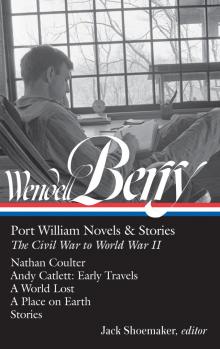 The Selected Poems of Wendell Berry
The Selected Poems of Wendell Berry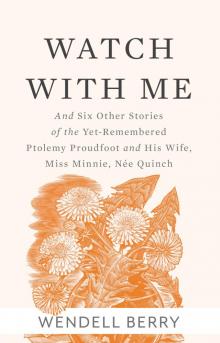 Watch With Me
Watch With Me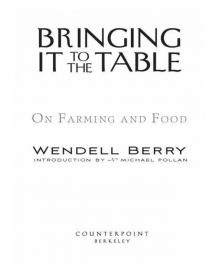 Bringing It to the Table: On Farming and Food
Bringing It to the Table: On Farming and Food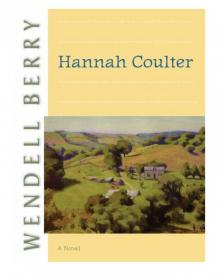 Hannah Coulter
Hannah Coulter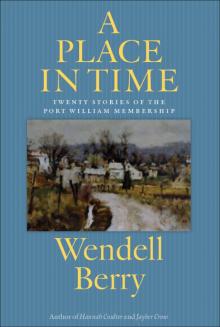 A Place in Time: Twenty Stories of the Port William Membership
A Place in Time: Twenty Stories of the Port William Membership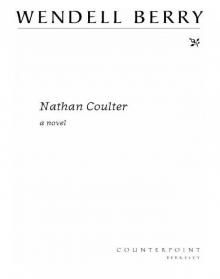 Nathan Coulter
Nathan Coulter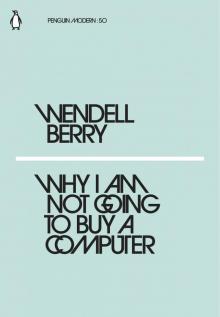 Why I Am Not Going to Buy a Computer
Why I Am Not Going to Buy a Computer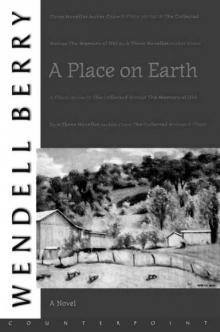 A Place on Earth
A Place on Earth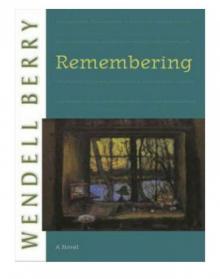 Remembering
Remembering New Collected Poems
New Collected Poems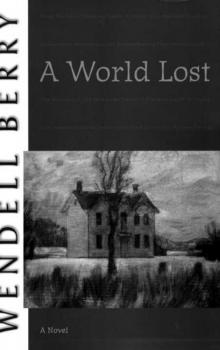 A World Lost
A World Lost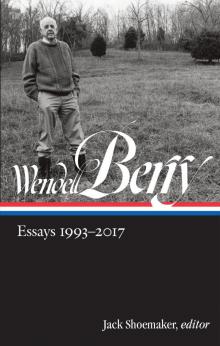 Wendell Berry
Wendell Berry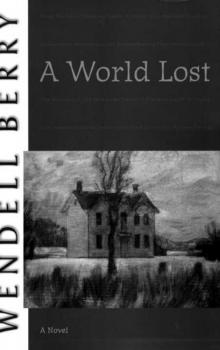 A World Lost: A Novel (Port William)
A World Lost: A Novel (Port William)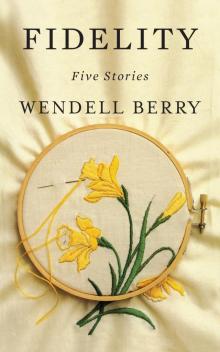 Fidelity
Fidelity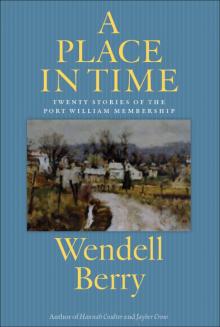 A Place in Time
A Place in Time